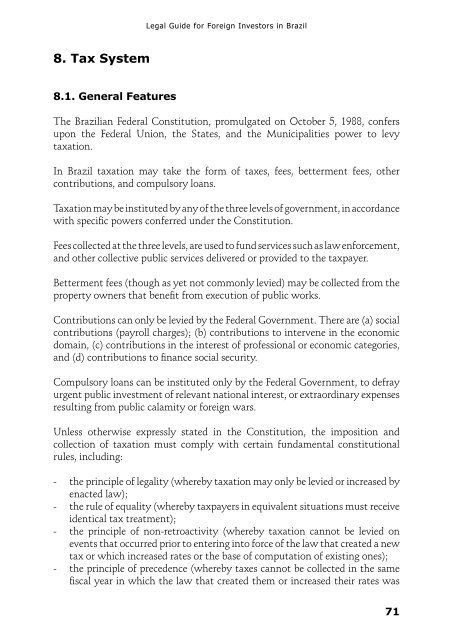Legal Guide for Foreign Investors in Brazil - Apex-Brasil
Legal Guide for Foreign Investors in Brazil - Apex-Brasil
Legal Guide for Foreign Investors in Brazil - Apex-Brasil
You also want an ePaper? Increase the reach of your titles
YUMPU automatically turns print PDFs into web optimized ePapers that Google loves.
<strong>Legal</strong> <strong>Guide</strong> <strong>for</strong> <strong>Foreign</strong> <strong>Investors</strong> <strong>in</strong> <strong>Brazil</strong><br />
8. Tax System<br />
8.1. General Features<br />
The <strong>Brazil</strong>ian Federal Constitution, promulgated on October 5, 1988, confers<br />
upon the Federal Union, the States, and the Municipalities power to levy<br />
taxation.<br />
In <strong>Brazil</strong> taxation may take the <strong>for</strong>m of taxes, fees, betterment fees, other<br />
contributions, and compulsory loans.<br />
Taxation may be <strong>in</strong>stituted by any of the three levels of government, <strong>in</strong> accordance<br />
with specific powers conferred under the Constitution.<br />
Fees collected at the three levels, are used to fund services such as law en<strong>for</strong>cement,<br />
and other collective public services delivered or provided to the taxpayer.<br />
Betterment fees (though as yet not commonly levied) may be collected from the<br />
property owners that benefit from execution of public works.<br />
Contributions can only be levied by the Federal Government. There are (a) social<br />
contributions (payroll charges); (b) contributions to <strong>in</strong>tervene <strong>in</strong> the economic<br />
doma<strong>in</strong>, (c) contributions <strong>in</strong> the <strong>in</strong>terest of professional or economic categories,<br />
and (d) contributions to f<strong>in</strong>ance social security.<br />
Compulsory loans can be <strong>in</strong>stituted only by the Federal Government, to defray<br />
urgent public <strong>in</strong>vestment of relevant national <strong>in</strong>terest, or extraord<strong>in</strong>ary expenses<br />
result<strong>in</strong>g from public calamity or <strong>for</strong>eign wars.<br />
Unless otherwise expressly stated <strong>in</strong> the Constitution, the imposition and<br />
collection of taxation must comply with certa<strong>in</strong> fundamental constitutional<br />
rules, <strong>in</strong>clud<strong>in</strong>g:<br />
- the pr<strong>in</strong>ciple of legality (whereby taxation may only be levied or <strong>in</strong>creased by<br />
enacted law);<br />
- the rule of equality (whereby taxpayers <strong>in</strong> equivalent situations must receive<br />
identical tax treatment);<br />
- the pr<strong>in</strong>ciple of non-retroactivity (whereby taxation cannot be levied on<br />
events that occurred prior to enter<strong>in</strong>g <strong>in</strong>to <strong>for</strong>ce of the law that created a new<br />
tax or which <strong>in</strong>creased rates or the base of computation of exist<strong>in</strong>g ones);<br />
- the pr<strong>in</strong>ciple of precedence (whereby taxes cannot be collected <strong>in</strong> the same<br />
fiscal year <strong>in</strong> which the law that created them or <strong>in</strong>creased their rates was<br />
71









